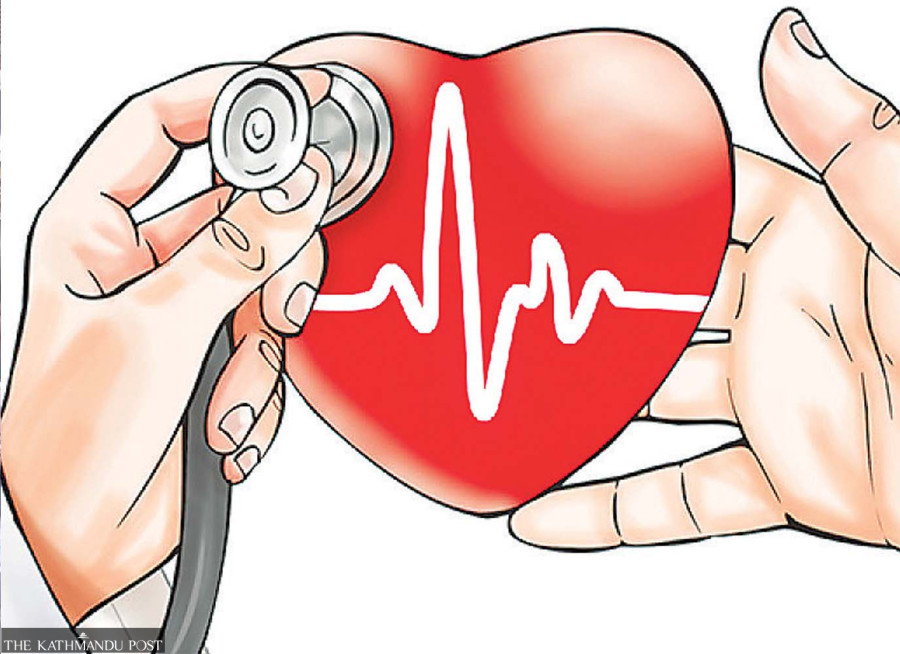Health
Cases of complicated heart ailments rise as people mistake it for gastritis
Experts say most cardiovascular diseases can be prevented by addressing behavioural risk factors—tobacco use, unhealthy diet and obesity, physical inactivity, and harmful use of alcohol.
Arjun Poudel
On Sunday morning, a 47-year-old man from Maharajgunj, Kathmandu was taken unconscious to the Basundhara-based National Cardiac Centre. Doctors attending to the patient said that the man had drunk alcohol the previous evening and had complained of severe chest pain that night.
“Instead of seeking hospital care immediately, the man preferred to buy over-the-counter gastritis medicines—Pantoprazole and Digene syrup—from a nearby pharmacy,” said Dr Abhishek Thakur, a consultant cardiologist at the Centre. “He was rushed to the hospital only after he fainted.”
This is a common refrain of many cardiac patients, who often mistake a serious heart problem for normal pain like gastritis or heart burns and reach the hospital at a late stage.
Doctors say patients often reach the hospital only after waiting for hours at home hoping the problems alleviate gradually without medical intervention. Such behaviour can be deadly sometimes, they say.
The cardiac patient, who resides near the Tribhuvan University Teaching Hospital, had pain in the upper part of his stomach, was sweating and at unease.
“We carried out an electrocardiogram immediately, which showed that the patient suffered a major heart attack,” said Thakur. “We somehow managed to save his life but significant damage had already been caused to his heart muscle.”
Cardiovascular diseases are disorders that affect the heart and blood vessels. Coronary heart diseases, deep vein thrombosis, and congenital heart disease are common conditions. But strokes and heart attacks are acute incidents, which are triggered by a build-up of fatty acids in blood vessels that block blood flow to the heart or brain.
The problem is one among several non-communicable diseases that have been taking a toll on developing countries like Nepal.
Higher prevalence rates of upper gastrointestinal symptoms in patients with cardiovascular disease may exist for a number of reasons, studies suggest. Doctors say patients experiencing both problems often complain of similar or overlapping symptoms.
They say most cardiovascular diseases can be prevented by addressing behavioural risk factors—tobacco use, unhealthy diet and obesity, physical inactivity, and harmful use of alcohol.
“For that education and awareness plays a vital role,” said Dr Om Murti Anil, an interventional cardiologist. “People often mistake serious heart problems for gastritis and this could prove deadly. Immediate medical attention is needed if the patient has severe and persistent chest pain, as it could be a cardiac cause.”
But the problem is patients often reach the hospital only after waiting for hours at home hoping the problem alleviates gradually.
“This trend must be changed,” said Anil. “We can bring behavioural changes by using all available means of mass communication including social media.”
Anil is among a few doctors who are very active on social media to raise awareness. With over 1.1 million followers on Facebook, he presents medical information in a way that the general public can easily understand. He regularly posts informative videos on his Facebook page.
A few days ago a 45-year-old man had uneasiness in his chest that lasted only a few minutes. The man went to a nearby hospital but doctors sent him home, as all of his reports were normal.
The next day the patient visited Anil for a further check-up, after he suspected heart attack symptoms based on the information he acquired from videos the doctor posted on his Facebook page.
Further investigation showed that his blood cardiac enzyme had risen indicating a minor heart attack he sustained the day before. He underwent an angiogram that showed 99 percent blockage in the right artery and a stent was placed.
The World Health Organisation says cardiovascular diseases kill 17.9 million people every year, which is 31 percent of all global deaths. Of that, 85 percent are due to strokes and heart attacks.
A 2019 study on the prevalence of noncommunicable diseases by the Nepal Health Research Council found that noncommunicable diseases including heart ailments accounted for 71 percent of the deaths in the country.
The council’s study was primarily focused on behavioural risk factors including tobacco and alcohol consumption, and biological risk factors like raised blood pressure, overweight, obesity, abnormal lipid prevalence, coronary artery disease, chronic obstructive pulmonary disease and diabetes.
The findings showed that the leading risk factor of deaths in 2019 was smoking, whose attributable death was 17.7 percent, followed by high systolic blood pressure 12.3 percent, household air pollution 11.2 percent, ambient air pollution 9.3 percent, diabetes 8 percent, high cholesterol, and kidney dysfunction among others.
Changing age structure and lifestyle—increasing sedentary behaviour, tobacco and alcohol use, unhealthy diets, high cholesterol level, obesity, physical inactivity, stress, and diabetes—are said to be the leading causes for the rise in non-communicable diseases, including cardiovascular diseases, study shows.
Doctors agree that despite the fact that cardiovascular diseases are on the rise, there continues to be confusion among people about whether the problem is only gastritis or serious cardiac problems.
Doctors say early diagnosis is one of the best ways to avoid serious complications.
“Early diagnosis and treatment can prevent life-threatening complications and deaths,” said Anil. “For that, we should properly use all available means of communication including mass and social media.”




 9.7°C Kathmandu
9.7°C Kathmandu















